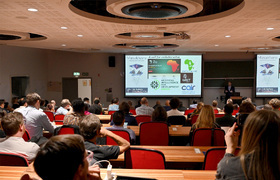Reimagining mobile money via stablecoins and WhatsApp
08 October 2025 | Story Kamva Somdyala. Photo Supplied. Read time 4 min.
After a successful trip to Singapore this year, University of Cape Town (UCT) student Julian Kanjere is excited about the potential of stablecoins to advance financial inclusion.
Stablecoins function as a reliable bridge between sovereign fiat currencies and crypto assets. In return, users have the advantages and potential benefits of crypto assets while mitigating their volatility. A South African Reserve Bank (SARB) 2023 paper noted, “Their [stablecoin] ability to perform the money-like features of functioning as a medium of exchange, a store of value and a unit of account means their use cases are essentially identical to sovereign currencies.”
Said Kanjere, who is a PhD candidate in the School of Economics: “A stablecoin is a representation of a government-issued currency on the blockchain, which means it does not exhibit the volatility associated with cryptocurrencies, and simultaneously harnesses the low cost and high-speed properties of using blockchain as a payment rail.”
The advantage with stablecoins is in their stability. “The value of the stablecoin is tied to the value of the domestic currency.”
Conference takeaways
Kanjere was in Singapore at the XRP Ledger Apex 2025 conference hosted by Ripple, a blockchain-based digital payment company. There, he spoke about the integration of Ripple’s recently launched RLUSD stablecoin with the Mandla Money WhatsApp Wallet. Mandla Money is a FinTech company which he co-founded with a fellow UCT alumnus. It is supported by the UCT Financial Innovation Hub. Mandla Money’s flagship product is Mandla Wallet, which allows users to send and receive money via WhatsApp and SMS. “It is timely that Mandla Money’s WhatsApp wallet recently added support for various stablecoins, including RLUSD, USDC and EUROC,” he said.
“The question for us was how we can take stablecoin into emerging markets.”
At the conference, he spoke about civil contingencies and cash voucher assistance and showed how Mandla Money’s Bulk Payments Web Portal and the WhatsApp Wallet can be used for distribution of cash assistance using the RLUSD stablecoin. This has use cases in distribution of relief aid, micropayments and government-to-person payouts, to name a few.
“The question for us was how we can take stablecoins into emerging markets, and one way, we think, is leveraging technology that is already there and is in use every day: WhatsApp. The live demo was well received because I think there was a clear view of how this can be useful for the distribution of social grants and relief aid, as digital cash, directly to recipients’ cell phone numbers.
Safeguards
However, there are risk factors and matters of trustworthiness associated with blockchain-based financial services. McKinsey & Company noted: “Although a stablecoin itself may remain securely on a blockchain, in the event of a bankruptcy, holders may be treated as unsecured creditors and not have full rights of access to reserves.” That is just one in several risks one could think of.
“There have been bad actors in this space. If you mention crypto, there will probably be someone who has fallen victim to a scam of some sort. I accept the scepticism associated with crypto, so building consumer trust is fundamental,” Kanjere said.
“One way to build trust is to have partnerships with existing and trusted financial services providers, to lend credibility to the work and getting people to use these technologies. From a consumer point of view, whenever you are dealing with digital forms of money, not only do they need to trust the platform, but also take safety precautions like safeguarding access pins and using trusted devices.”
Mandla Money ensures a layer of safety by limiting the amount of money one can transact so that should one find themselves in a precarious position, financial ruin will not befall them.
“We don’t want people to be left behind and we want them to be financially empowered,” Kanjere added.
 This work is licensed under a Creative Commons Attribution-NoDerivatives 4.0 International License.
This work is licensed under a Creative Commons Attribution-NoDerivatives 4.0 International License.
Please view the republishing articles page for more information.










